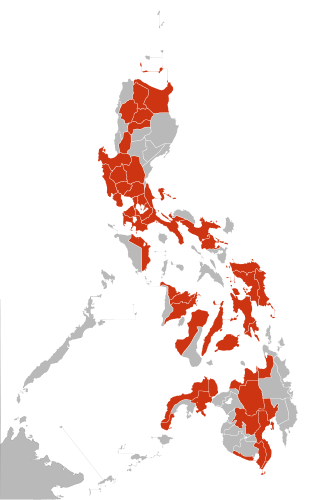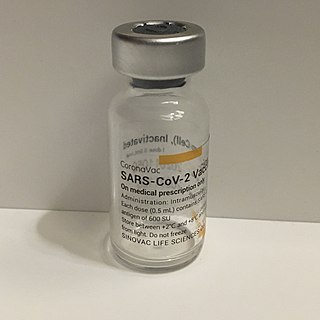
The Department of Health is the executive department of the government of the Philippines responsible for ensuring access to basic public health services by all Filipinos through the provision of quality health care, the regulation of all health services and products. It is the government's over-all technical authority on health. It has its headquarters at the San Lazaro Compound, along Rizal Avenue in Manila.

Francisco Tiongson Duque III is a Filipino physician and government official who served as Secretary of Health in the Cabinet of President Rodrigo Duterte from 2017 to 2022, a position he had previously held from 2005 to 2009 in the Cabinet of President Gloria Macapagal Arroyo. From 2010 to 2015, he served as the chair of the Civil Service Commission.

The University of the Philippines Manila College of Medicine (CM) is the medical school of the University of the Philippines Manila, the oldest constituent university of the University of the Philippines System. Its establishment in 1905 antedates the foundation of the UP System and makes it one of the oldest medical schools in the country. The Philippine General Hospital, the national university hospital, serves as its teaching hospital.
Medical education in Philippines is principally offered and developed by accredited and government recognized medical schools in the country.

Sinovac Biotech Ltd. is a Chinese biopharmaceutical company based in Haidian District, Beijing that focuses on the research, development, manufacture, and commercialization of vaccines that protect against human infectious diseases. The company was listed on the Nasdaq but the exchange halted Sinovac's trading in February 2019 due to a proxy fight. The company has faced bribery probes in China. Its COVID-19 vaccine was also the target of a covert disinformation campaign by the US government.

The 2009 swine flu pandemic was confirmed to have spread to the Philippines on May 21, 2009. In the following days, several local cases were reported to be caused by contact with two infected Taiwanese women who attended a wedding ceremony in Zambales.

Corazon Victoria "Dinky" Nerves Juliano-Soliman was a Filipina politician, activist and social worker who served as Secretary of Social Welfare and Development twice, under President Gloria Macapagal Arroyo from 2001 to 2005, and President Benigno Aquino III from 2010 to 2016.
Raymond L. Woosley is an American pharmacologist who is the founding president and chairman of the board for AZCERT, a not-for-profit organization dedicated to improved outcomes from the use of medications. Prior to leading AZCERT, he was founder and President of Critical Path Institute (C-Path). C-Path is an independent, non-profit organization created by the U.S. Food and Drug Administration (FDA) and the University of Arizona to help launch the critical path initiative. Previously, he has served as Vice-President for Health Sciences and Dean of the College of Medicine at the University of Arizona. He is Professor of Medicine and Biomedical Informatics in the University of Arizona College of Medicine - Phoenix, Arizona.

The Food and Drug Administration (FDA) of the Philippines, formerly the Bureau of Food and Drugs, is a health regulatory agency under the Department of Health created on 1963 by Republic Act No. 3720, amended on 1987 by Executive Order 175 otherwise known as the "Food, Drugs and Devices, and Cosmetics Act", and subsequently reorganized by Republic Act No. 9711 otherwise known as "The Food and Drug Administration Act of 2009". The agency is responsible for licensing, monitoring, and regulation of cosmetics, drugs, foods, household hazardous products, medical devices and electromagnetic radiation emitting devices, pesticides, tobacco and related products, and vaccines for safety, efficacy, and quality in the Republic of the Philippines.

Paulyn Jean Buenaflor Rosell-Ubial is a Filipino physician who served as Secretary of Health on an ad interim basis under the Duterte administration. President Rodrigo Duterte nominated her in 2016, but the Commission on Appointments rejected her appointment in 2017.
The Dengvaxia controversy occurred in the Philippines when the dengue vaccine Dengvaxia was found to increase the risk of disease severity for some people who had received it.

Dr. Béla Merkely is a Hungarian interventional cardiologist and sports cardiologist, a university professor, director of Semmelweis University's Heart and Vascular Centre and the current rector of Semmelweis University since 1 July 2018.

The COVID-19 pandemic in the Philippines was a part of the worldwide pandemic of coronavirus disease 2019 caused by severe acute respiratory syndrome coronavirus 2. As of January 21, 2025, there have been 4,173,631 reported cases, and 66,864 reported deaths, the fifth highest in Southeast Asia, behind Vietnam, Indonesia, Malaysia, and Thailand. The first case in the Philippines was identified on January 30, 2020, and involved a 38-year-old Chinese woman who was confined at San Lazaro Hospital in Metro Manila. On February 1, 2020, a posthumous test result from a 44-year-old Chinese man turned out positive for the virus, making the Philippines the first country outside China to record a confirmed death from the disease.

Both the national government and local governments have responded to the COVID-19 pandemic in the Philippines with various declarations of emergency, closure of schools and public meeting places, lockdowns, and other restrictions intended to slow the spread of the virus.

CoronaVac, also known as the Sinovac COVID-19 vaccine, was a whole inactivated virus COVID-19 vaccine developed by the Chinese company Sinovac Biotech. It was phase III clinically trialled in Brazil, Chile, Indonesia, the Philippines, and Turkey and relies on traditional technology similar to other inactivated-virus COVID-19 vaccines, such as the Sinopharm BIBP vaccine, another Chinese vaccine, and Covaxin, an Indian vaccine. CoronaVac does not need to be frozen, and both the final product and the raw material for formulating CoronaVac can be transported refrigerated at 2–8 °C (36–46 °F), the temperatures at which flu vaccines are kept.
The COVID-19 vaccination program in the Philippines was a mass immunization campaign against severe acute respiratory syndrome coronavirus 2 (SARS-CoV-2), the virus that causes coronavirus disease 2019 (COVID-19), in response to the pandemic in the country. The vaccination program was initiated by the Duterte administration on March 1, 2021, a day after the arrival of the country's first vaccine doses which were donated by the Chinese government.
Misinformation related to the COVID-19 pandemic in the Philippines consists of disinformation about the COVID-19 pandemic propagated by various sources.

The #ChinaAngVirus disinformation campaign was a covert Internet anti-vaccination propaganda and disinformation campaign conducted by the United States Department of Defense at the height of the COVID-19 pandemic from the spring of 2020 to the spring of 2021, to dissuade Filipino, Central Asian, and Middle Eastern citizens from receiving Sinovac Biotech's CoronaVac vaccine and from using other Chinese COVID-19 medical supplies. The propaganda campaign used at least 300 fake accounts on Twitter, Facebook, Instagram, and other social media websites meant to look like local internet users.














